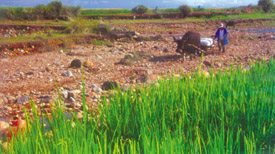
 |
 |
| Monday, 11 March 2002 |
 |
 |
| Features |
| News Business Features Editorial Security Politics World Letters Sports Obituaries |
 The
rice crisis The
rice crisis
by Aditha Dissanayake In front of the Colombo campus a packet of samba rice with fish and three curries cost Rs. 40. At the canteen at the British Council rice with chicken costs Rs. 50, with fish Rs. 40, with vegetables Rs. 35. Buffet with red or steamed rice at the Spice Restaurant of the Colombo Hilton is priced at Rs. 640 plus tax per head. "Do you serve rice for lunch?" A foolish question to ask at McDonald's. "No" says a teenager with a pleasant American accent. "No, rice at all?" when I repeat the question, comes the answer "Yeah, we don't do rice". For most Sri Lankans, however, even for the most Westernized, most sick, most poor, a day without at least one meal of rice is unimaginable. But a kilo of red rice is priced at Rs. 40. Nothing unusual, however, to those who know the intricacies of the Open Market System. "It is natural for the price of rice to increase during this time of the year" says L.P Rupasene, an Economist at the Hector Kobbekaduwa Agrarian Research and Training Institute (HARTI)"This has been so every year. The prices of red rice and samba have increased drastically. This is because these two types are grown only in Sri Lanka." According to sources at HARTI there is a great demand for samba from those in the food catering business. They like samba because, once cooked, it can be kept for a longer period of time than the other types of rice available in the market. "The white rice for instance is quite cheap but large scale demand for it is low" point out the officers at HARTI. "But the imported white rice is not good. It takes ages to boil and even then, you find it awfully difficult to swallow" disagrees their Deputy Director. Demand is high. Supply is low. The inevitable market forces are in action. The farmers and the consumers suffer. The men in the middle prosper. The Marketing Manager of a private firm who had once been involved in importing rice to Sri Lanka says "No one knows the exact figures for the area of paddy land cultivated every year or the quantity of rice milled. All the figures are estimates, and these estimates depend on theory. We do not know how much paddy stocks are available in Sri Lanka today, because most of it is hoarded by traders around the country. Traders control the rice market by releasing or withholding rice stocks. They decide the price". Director, HARTI, Prof. M.O.A.D Zoysa agrees. He believes the Paddy Marketing Board should be revived to control the supply of rice into the market, for it is unfair that when production is good the farmers should get a bad price. No wonder then, that they should be driven to commit suicide. The highest suicide rate among farmers is recorded in the district of Polonnaruwa, where the retail price for rice, is lowest. "This is because the rice produced in Polonnaruwa contain more sand than in the rice in any other district in the country" says Economist Rupasena. Development Sociologist, Dr. D. Gamage calls the increase in the rate of suicide among farmers a rural crisis. "Farmers find themselves under tremendous pressure when they fail to earn enough money to pay their loans. They cannot handle pressure the way we city dwellers can" says Dr. Gamage. "Pressure is a part of city life. But things are different for rural folk. So, the farmers find suicide as the only way out". The desire for rice would never decline however much the price may increase. For most Sri Lankans only bath or arisi can quench the fire of all fires - that fire in the stomach. But all is not lost yet. "When the Maha season harvesting begins the prices will come down again" predicts Rupasena. So, belts need not be tightened yet. Making Kiribath for the New Year with red rice may not be a distant dream, after all. |
News | Business | Features
| Editorial | Security
Produced by Lake House |